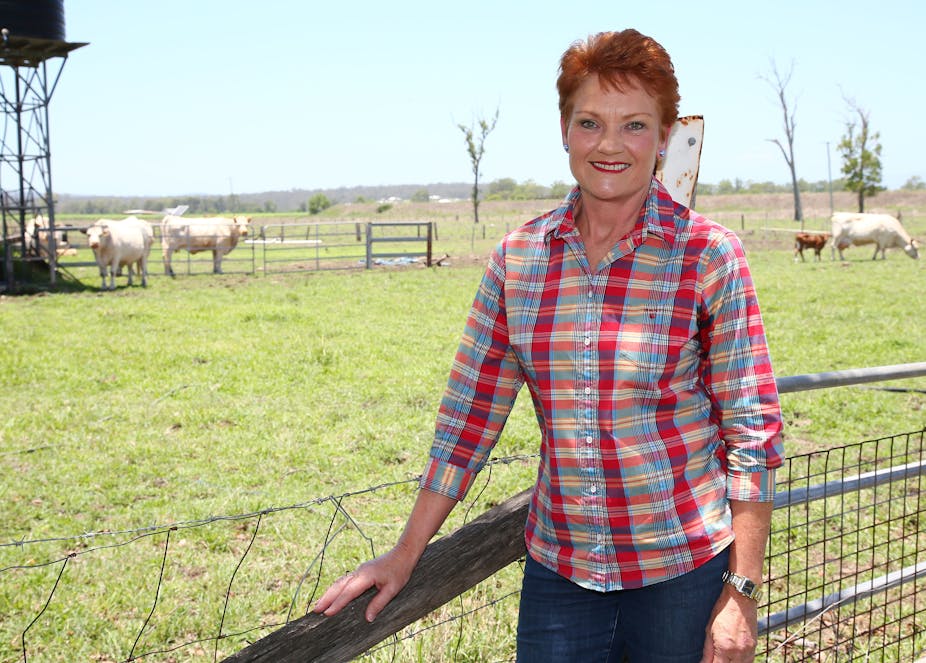The Australian Constitution says residents have the right to water from the rivers for irrigation and conservation purposes but governments have brought in laws that are restricting this – One Nation’s Pauline Hanson, campaigning for the January 31 Queensland election.
Concern about coal seam gas exploration and its impact on groundwater has become a crucial issue in many electorates across regional Australia, including in the current Queensland election. It’s one of the few issues in the campaign that unites minor parties and independents from across the right and left of politics, including Katter’s Australian Party, the Palmer United Party and the Greens.
Queensland-born radio host Alan Jones has also weighed into the campaign against coal seam gas projects, encouraging Queensland voters to support “salt of the earth people with integrity” including independent MP Peter Wellington.
Former federal MP Pauline Hanson is standing as the candidate for Lockyer, currently a safe rural Liberal National seat west of Brisbane, where she has been campaigning on coal seam gas and water.
But has Hanson got it right on the Constitution and landholders’ rights to water?
Water rights in the Constitution
Water rights are of particular concern to farmers who have farms close to coal seam gas mining operations, as they rely on the groundwater to irrigate their crops or for livestock. A commonly expressed fear is that coal seam gas extraction could deplete groundwater supplies and contaminate the aquifer.
Hanson’s claim that the Constitution provided some protection for farmers seems to rely on section 100, which contains the only reference to the rights of residents to water in the Constitution. It states:
The Commonwealth shall not, by any law or regulation of trade or commerce, abridge the right of a State or of the residents therein to the reasonable use of the waters of rivers for conservation or irrigation.
Limits on constitutional protection for water
Despite the fact that water is such a scarce resource in Australia, there have been very few legal cases involving section 100. Prior to the Tasmanian Dam Case in 1983, the wording of the section had not been considered directly by the High Court. Since that decision, the Court has only had examined section 100 on one other occasion.
There are a number of difficulties with relying on section 100 to protect farmers’ water rights and prevent any state government in Australia from allowing further coal seam gas exploration.
Among the reasons why the Constitution may not provide as much protection as Hanson hopes is that section 100 only applies to Commonwealth laws or regulations – and not to state laws or regulations.
Section 100 entitles a State or its residents to the reasonable use of “the waters of rivers”. In the case of coal seam gas mining, the primary concern is with the impact it could have on groundwater.
But in 2010, the High Court drew a distinction between groundwater and rivers, and held that section 100 applied only to the water flowing in rivers, which further limits section 100.
What other protections are there?
In 2013, the Commonwealth Government amended the Environment Protection and Biodiversity Conservation Act (EPBC Act) so that where a coal seam gas development will have or is likely to have a significant impact on a water resource, the development will be subject to federal assessment under the Commonwealth EPBC Act.
But for those hoping that Hanson is right, and that the Constitution might give them some extra protection against coal seam gas impacting on their water supplies, I have to say I think she’s being too optimistic.
The “right” that section 100 refers to is a “right” against the Commonwealth. And as I’ve just explained, the Commonwealth (meaning the federal government) has a more limited role when it comes to coal seam gas and water.
Instead, the power to legislate on these matters falls largely to the state Parliament and the government of the day.
If Queenslanders do have any concerns about water and coal seam gas, they should certainly have their say. But it’s an issue mainly to take up with your state MP or candidates, rather than counting on the Australian Constitution to provide the solution.
Read more of our Queensland election 2015 coverage.

